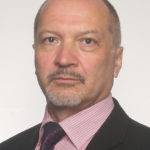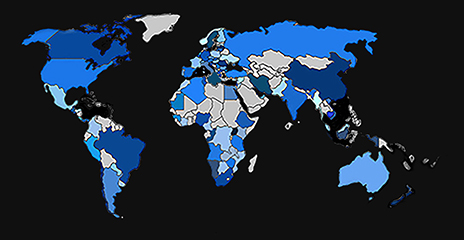
Addis Ababa — In the beginning was .com, followed by a host of other .somethings, but on Friday, 32 years after the world’s first domain name was registered, the African Union (AU) has launched .africa.
Africans who want to register a website will be able to apply for a .africa domain name in the coming months, which outgoing AU commission chairwoman Nkosazana Dlamini-Zuma said would allow the continent’s people and businesses to better reach the world.
"With .africa, I would say Africa has finally got its digital identity," said Dlamini-Zuma, who will hand power to Chadian foreign minister Moussa Faki Mahamat next week after four years at the helm of the continental body.
Sub-Saharan Africa has one of the lowest rates of internet penetration in the world, according to the World Bank, with only about 22% of people online compared to the global average of 44%. The AU has vowed to increase broadband internet penetration by 10% by next year as part of its "Agenda 2063" development proposal.
As Africa’s largest economy, SA dominates African presence online, holding 1.1-million of the 2-million website registrations on the continent, said Lucky Masilela, CEO of ZA Central Registry, the SA-based company that will oversee .africa.
High fees are an obstacle to many people who want to register a website, Masilela said. In some African countries it can cost as much as $250 (€235) but Masilela said .africa addresses will be available at a cut-rate price of just $18 to anyone on the continent: ".africa is going to be a market disruptor and will assist in lowering the cost of domain names."
The AU is hoping proceeds from the domain registrations will help cover some of its administrative costs and fund the AU commission. The domain is due to be available to the public in July but it remains unclear how strong demand will be. Source: Business Live

Gregory Gettinger, a Ph. D. graduate from the University of Vienna in Marketing and Technology (1987), and a Business Case Study Program graduate from Harvard and Stanford Universities (1988 and 1990), Dr. Gregory Gettinger begins his career with PepsiCo International as a Marketing Trainee and Franchise Manager in Vienna.
From 1989 to 1995, he acquires his first experience in the packaging industry as Managing Director with Frantschach AG (today: Mondi), a business generating 40 million Euros in sales, where he leads a heavy restructuring and turn-around case.
Shifting industries to tackle the media giant, Gettinger joins Bertelsmann AG, a 20 billion Euro sales company. As MD Marketing and Sales of Premiere GmbH, he directs the development of the first Pay TV in Germany, achieving 2 million subscribers within four years.
His next step takes him in 1999 to the position of Managing Director with M-real Deutschland GmbH, assuming responsibility for 700 million Euros in Sales and Marketing.
In 2006, Gettinger joins the Corporate Executive Board as Executive Vice President of M-real, and takes over responsibility of their Publishing business, where he develops and implements a new strategy, and executes significant cost reduction programs.
Gettinger expands his directorate to the Commercial Print business in 2007, combining it into a new Graphics business area with 9 mills and a turnover of 2 billion in sales.
As of January 2009 merge between M-real Graphics and Sappi, Gettinger became a Member of Sappi Fine Paper Europe’s Executive Board and officiated as Director of Procurement, Supply Chain and Specialities.
From 2012 onwards Gregory Gettinger focuses onto his biotech company, which he founded in 2002. Today Gregory also consults a wide range of companies in various fields. Besides the consulting business, he owns and manages his a very specialized biotech business, which focuses on converting minor grade feedstocks into biodiesel.
Dr. Gettinger joined CBA as associated Consulting Professional in February 2016.

An intermediary is a person who represents Buyer or Seller in an M&A transaction. Commonly called investment bankers or business brokers, this breed of M&A advisers is essentially salespeople, and what they’re selling is a company.
The intermediary is often the quarterback during the M&A process, and Buyers or Sellers thinking about hiring an intermediary should look for deal experience, demeanour, confidence, business understanding, creativity, and accounting skills when hiring that quarterback.
For Seller, an intermediary is the one who helps execute the M&A process, including contacting buyers, structuring the deal, and performing due diligence.
The intermediary can also be the voice of reason for an otherwise-emotional Seller. The business sale is likely to be the largest transaction of Seller’s life, and he needs someone who isn’t emotionally tied to the business to represent him. (That’s why Sellers should never represent themselves in a sale.)
For Buyer, an intermediary is the one who does the most difficult of jobs: contacting Sellers and getting the appropriate information for Buyer’s offering document and due diligence. Depending on the needs of the client, the intermediary may also help with the negotiating and structuring of a deal, although many Buyers who utilize an intermediary for help with finding targets prefer to do the negotiating and structuring themselves.
Most Buyers (and their advisors) these days review the copious amounts of data generated by due diligence in a secure, online data room, so when hiring an intermediary, make sure that person is well versed in online data rooms.
What the intermediary doesn’t do is hammer out all the details of the purchase agreement (that’s for the lawyers) or go through all the books in order to perform a comprehensive financial analysis (that’s the job of the accountants).
Buyers should note that Sellers are usually extremely reluctant to speak to a competitor or a company they perceive as a competitor. For that reason, using an intermediary can be a very useful buffer when contacting Sellers. A Seller is more apt to talk with an intermediary and quite often more willing to open up and provide quite a bit of information. Source: INSEAD.edu - by Bill Snow (https://www.insead.edu/executive-education/company-growth-strategies?CampaignId=GGL_Search_A&SiteId=GGL&AdId=MNA&device=c&term=m%20%26%20a&gclid=CPbR38OZwtICFcMHkQodDfoOmw)

CBA associated with Martin Hamilton (pictured), a professional with long-term expertise and success in executive search and headhunting services across most sectors.
CBA can now offer its clients years of experience and is therefore well placed to advise them on the best methods to approach recruitment projects. The main sectors are: Engineering, Environment, Financial FMCG, Industry, Legal, Mergers & Acquisitions, Pharmaceutical, Service Industries, Technology & Telecommunications.
CBA provides cross-border Executive Search to large and small corporations through personalised and flexible services, offering in-depth local knowledge of each job market as well as reliable information on compensation and industry trends across the network. We conduct regional or global searches to identify, approach and attract the most highly regarded candidates available anywhere. This method is typically used for positions with a multi-country or global responsibility. Good leadership talent is mobile and where appropriate we can conduct searches in most countries to attract the best candidates.
We handle assignments in one or more countries according to the requirements of the client organisation and provide a practice consultant as appropriate to collaborate with the retained consultant in the provision of in country support such as research, meeting facilities, taking up references in the local language etc.
If the client needs a talented CEO capable of running operations in Europe, North America and across Asia it makes sense to try and recruit the role from all three regions. In this case and many others like it, it makes sense to hire one consultant to recruit from all available talent no matter where they may reside. At CBA, cross border search eliminates the geographic borders that constrain most search firms from finding the best talent.
By working with CBA you can be confident that you will vastly reduce the risks of a failed hire and at the same time be confident that your recruit is the best candidate available for your role.
To discuss your global recruitment needs please get in touch with Martin Hamilton @ CBA.

Ari Virtanen is a native Finn and has a degree both in engineering (B.Sc. Eng.) and business administration (MBA), with university level post graduate studies in organisational psychology, business law and administrative sciences. He has over 30 years of practical experience in leadership and in strategic and operative management positions in the international market place. He has lived over 14 years on four continents, in six countries and has developed customer or supplier relations in over 70 countries.
Prior to establishing Solidior Ltd. he worked over 20 years in MNE size enterprises in various positions, such as managing director, manager of procurement and logistics, sales and marketing manager and contractual maintenance manager. For the last 10 years, he has managed SME size companies with an international business scope.
Ari Virtanen is a certified Turnaround Management Consultant and is specialized in Interim & Crisis Management and Turnaround Management of underperforming companies, predominantly with an international business scope and companies in the transition processes towards international market place. He has also practical experience in insolvency and bankruptcy proceedings and related corporate restructuring, divestments and M&A processes.
Ari Virtanen has managed both sales offices and production companies (with LEAN and OEE philosophies, FMS and robotic production methods) and has relocated several factories to new locations nationally and abroad. He has been in charge of a number of Post- acquisition takeover cases in Latin America, Africa and East Europe. He can manage business relations and lead the companies and processes in Finnish, English, Estonian, Spanish and Swedish languages.
Ari Virtanen joined CBA as associated M&A Adviser in December 2015.

Buying or selling a business is probably the single largest financial transaction an individual will make in their lifetime. We strongly encourage you to engage a professional for this complicated process.
Selling...
Selling a business is a big step for most business owners. You only get the chance to sell your business once and you need to do it right the first time. If you are considering selling, you may want to visit our F.A.Q page or review some of the Useful Articles we have compiled.
F.A.Q.s (click here)
Buying...
Buying a business is a life changing event. It can lead a person down a path of financial and personal freedom. Although people buy businesses for many different reasons, it always takes a significant financial and time commitment. Utilizing an expert provides a valuable resource for the smart buyer who is looking to maximize their investment and minimize their mistakes. Call one of our members today to find out how their services can work for you.
Source: APMAA

When it comes time to sell their businesses, the first question that most owners ask is: “How much can I get?” It makes sense. Owners are eager to cash in and be rewarded for all of the hard work they have poured into their businesses over the years.
But the reality is that for many businesses, the initial valuation will be a much lower number than their owners want to see. In order to net enough from the sale (after taxes and fees) to fund the rest of their lives, most owners will have to work to boost the value of their businesses – sometimes significantly.
One great way to create value is to build recurring revenue into your business model.
The Benefits of Recurring Revenue
Recurring revenue is guaranteed revenue for some period of time (for example, through a product subscription). Because this type of revenue does not require the same level of sales and owner effort as one-time revenue, it typically results in much higher profit margins and is always highly coveted by buyers. The evidence shows us that businesses with recurring revenue models have higher valuations than those that don’t. In 2012, Adobe went from a one-time purchase model of its software to a monthly subscription model. Two years later, its market cap was $35.5B versus $16B – a 115% increase.
Examples of recurring revenue include:
Recurring revenue is stable and predictable income, and as such results in higher customer lifetime value. In addition, recurring revenue can help your business weather economic recessions and is likely to simplify your business operations in many ways.
Understanding the Value of Your Business from a Buyer’s Perspective
Companies on a growth trajectory that can demonstrate increasing cash flows through new customer acquisition, current customer retention, and increasing market share are always much more attractive to a buyer than those that have shown little growth. Buyers want to know that revenue and cash flow are growing at a steady rate and will continue to do so in the future. And a recurring revenue model can be a great way to increase the value of the business in the eyes of a potential buyer. In Cashing Out of Your Business – Your Last Great Deal, we discuss 8 key drivers of business value that owners need to focus on before selling their businesses:
Adding a recurring business model is one of the best ways to address a few of these value drivers, boost profits, and enhance future growth potential — thereby increasing the value of a business in the eyes of a prospective buyer.
Even well-established businesses can usually add some kind of recurring revenue to their model and reap these rewards. It may require that owners think “outside the box” or change how they have operated historically, but it will pay off in the long term. Buyers will pay more for quality companies and those that have growth potential.
By assessing your business objectively, you will be able to identify areas for improvement so buyers will see your business in the best possible light. Planning in advance will give you time to improve your business and maximize its value. As a result, you will improve your chances of selling and obtaining the highest price for your business.
Source: Axial - By Jane Johnson, Business Transition Academy | February 2, 2017

Verizon's purchase of Skyward signals how the telecom giant sees drones as a key part of its fast-growing Internet of Things business unit.
Verizon said it has acquired Skyward, a startup focused on drone management.
The acquisition of Skyward, based in Portland, Oregon, will bring tools for drone operations into Verizon's Internet of Things portfolio. Verizon has been investing in IoT tools for the enterprise and its IoT business ended 2016 with nearly $1 billion in revenue.
Terms of the deal weren't disclosed. Verizon Ventures was already an investor in Skyward.

Gonçalo da Cunha Ferreira - Law Degree from the Portuguese Moderna University, Thames Valley University (London, academic year 1997/98), Course of Arbitration and Conciliation – ASIPI – Punta del Este, Uruguay (2005), Course on Mediation and Arbitration – ASIPI/INTA – São Paulo, Brazil (2006), Course on Mediation – ASIPI – Cartagena de las Indias, Colombia (2007), WIPO Advanced Workshop for Mediators on Intellectual Property Disputes – Geneva, Switzerland (2008) Course on Strategic Management Applied to Small and Medium Companies (INDEG/ISCTE).
Gonçalo is a Member of the Portuguese Bar Association, furtnermore of ASIPI – Interamerican Association of Intellectual Property (Member of the Arbitration and Conciliation Committee); ACPI – Portuguese Association of Intellectual Property Consultants; AIPPI – Portuguese Group of the International Association for the Protection of Intellectual Property; Founding member and member of the Board of Directors of ADPM – Association for the Defense of Product Brands; Spanish Arbitration Club ECTA – European Communities Trade Mark Association; FICPI – International Federation of Intellectual Property Attorneys; INTA – International Trademark Association; PTMG – Pharmaceutical Trade Marks Group.
Gonçalo da Cunha Ferreira joined CBA as Legal Adviser in February 2015.
